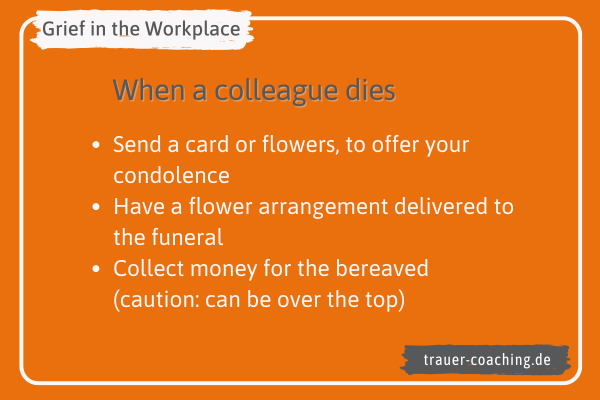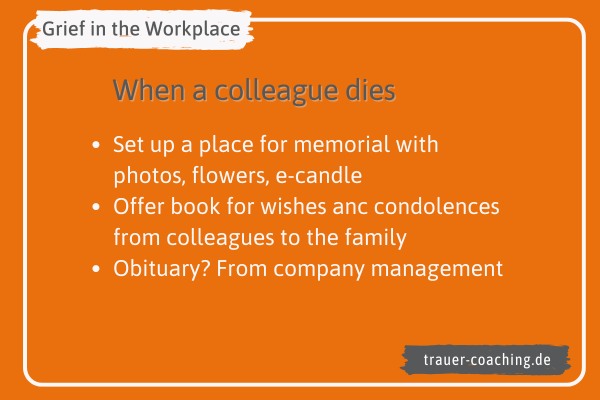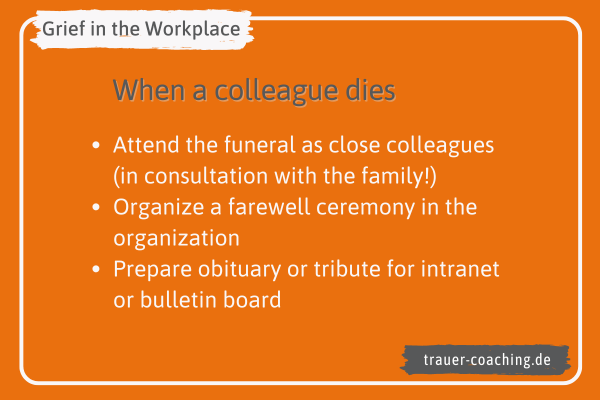
Sudden death of a colleague:
How to react? And what to do?
A colleague from work has passed away and you are unsure how to deal with their death? The blog article shares
- some thoughts on behavior and
- some suggestions what you can do with other colleagues.
This is the third article in a longer series. Part 1 links tips for HR expert and managers. Article 2 shares guidelines for communication . Part 4 discusses ideas for a case when a colleague is in mourning..
If a colleague dies suddenly, this ususally is a distressing situation at work. This is even more probably true if the death was unexpected or happened at work.
On the one hand, you might have seen each other on a regular bases, collaborated or perhaps even had a good relationship. On the other hand, you might have kept a lid on personal details, which is not unusual in a workplace relationship.
That said, it is not uncommon to feel uncertainty about how to deal with a colleague's death.
I hope you can find some inspiration in these tips on how to behave and profit from impulses for joint activities within a team or group of colleagues.
Handling an employee's demise?
Contact me, free of charge
phone: +49 179 2601797
via e-mail hallo @ trauer-coaching.de




What to Do if a Colleague Dies?
Even if you didn't know the deceased colleague well, it might feel strange when something as personal as death enters the job sphere.Many employees are hesitant to to share something as personal as grief in their work context.
This article focuses on options for colleagues of the deceased. If you are a team manager that has to handle an employee's death, take a look at these tips for managers.
Anxiety after the Sudden Death of a Colleague
A colleague's death may affect you in ways you are not prepared for. If you encounter anxiety, lose hope or are on edge, consider talking about this with a trusted person. This person can be your manager, or they can be someone from your personal life, like a friend, a doctor, a therapist.
Find out what is bothering you. This could be the shock of the sudden death of a colleague, for example, or the shock of having worked closely with the deceased. And it can touch on your own fears.
As a colleague, another aspect might concern you: the distribution of the workload or the impact on your own work. This is something to discuss with your manager. If you are not feeling fully up to speed after the (sudden) death of a colleague, you can also send this signal. If urgent projects or tasks are pending on your end, you could include a request for support. If the deceased colleague was working on something that needs attention, you can offer to follow up on this.
Colleague Passes Away: Possible Aftershocks
Some people react emotionally at the news of a death; others want to talk or, on the contrary, be left alone; and still others seem to go back to business as usual. Every reaction is possible.
It is important to know that if a colleague has died, the message can create aftershock, with a reaction after work or on the weekend. Keep that in mind and pay attention to unusual feelings or symptoms - for yourself and people around you. You might also consider being a little more lenient if you or others are impatient or lack concentration.
Speak about the Deceased Colleague
Talk to colleagues about the deceased. Especially if it seems strange at first. A sentence like "It's strange that he (or she) is not sharing this joke" over morning coffee can break the ice. Even if only a few people mention them at first, you can be sure that most will notice that you fill a void by naming them. Otherwise it might be occupied by an elephant in the room.
If you and others in the team or organization feel the need, you can expand the conversation about the deceased: Remember what the person stood for in the team or department, what he or she initiated or improved, and when the person is especially missed. Please be sensitive if someone would rather not share or be part in this - for whatever reason!
Yes to Talking, No to Gossip
It is okay to talk about the deceased and about what is generally known. And even if you are very interested: out of respect for the deceased as wekl as out of respect for the bereaved, and as a gesture to colleagues who may have worked more closely with the deceased colleague: Please avoid questions (or answers) that root in pure curiosity or speculation, for example about the cause of death.
Death of a Colleague: Ideas for Joint Gestures
Some colleagues might wish to express their grief and shock in a collective gesture. This can be achieved with something done company-wide or limited to a department or team. Below are some ideas; what is appropriate depends on the people in the company and the corporate culture.
The following applies to all ideas: Colleagues you approach about a joint gesture should already know about the colleague's demise. And it's okay if someone would rather not participate.
- Send a condolence card to the family A rule of thumb for this: more is less. One well-phrased sentence with signatures often does a better job than an abundance of empty words. And please do not use company stationery.
- Send flowers, with the card or stand-alone
- Set up a place of remembrance: with a photo, flowers, possibly an e-candle (a regular candles might not be permitted in the office).
- Put out a book for condolences if colleagues want to write a few words of appreciation or farewell, or create a digital counterpart; both can be handed over to the family later.
- Organize a flower arrangement for the funeral. Please consider that there might not be much space with an urn. In this case, you could give a voucher for later use from a local gardener.
- Collect money for the family, for example as a contribution to funeral expenses (and please consider if this may be seen as inappropriate).
- Consult with relatives if colleagues may attend the funeral.
- If it is not possible (for everyone) to attend the funeral, a farewell ceremony can be held at the company.
- If a farewell ceremony is planned in the company, the family / bereaved can be invited.
- Publish an internal tribute on the intranet or bulletin board: What do we remember? What did this person stand for? What did we particularly appreciate about them? In addition to the company management, a good “sender” is the manager or direct team colleagues.
blank
If you are planning something in a team or circle of colleagues, it might be a good idea to clarify what is planned by company management: often a wreath is ordered there, or an obituary is placed in a newspaper.
And after... Time Does not Stop
The most difficult point might be after a few weeks: What happens to the desk or workbench? How takes care of personal belongings in a locker or container? And is it impious to ask whether or when the position will be filled again?
Desk / Workplace and Personal Belongings
Ideally, the people who are directly affected, i.e. office neighbors and direct colleagues, should decide what to do with deceased colleague's desk. They can find an agreements in the first few days and plan to revisit the topic after a few weeks or months. This way, you can avoid anyone having to be afraid to broach the subject.
You will probably notice when enough time has passed. Clean out the workplace together if necessary.
Please be careful: do not carelessly throw away things whose emotional value you cannot assess. It is better to pack up personal items like postcards, pictures, etc in case the family would like to have them.
Would you like a keepsake?
If you would like to make a note of the birthday or date of death of the deceased, this may be helpful for you. It may not be so relevant in the following year. And it may be a good time to contact the bereaved if they were well acquainted with work colleagues.
If you are unsure whether you want to address e.g. the birthday in the team to remember the deceased colleague: Think about how often the colleague's name has come up in the meantime (not mentioned by yourself). And decide from there.
When a new colleague arrives
And at some point, a new colleague will join the team or company.
You might consider putting yourself in their shoes. It could be quite difficult for the person who is coming in.
Ideally, you can agree within the team or with your manager about whether or what you share about the deceased. And if in doubt: the new person has a right to make their own place in the team or department.
This is the third article in a longer series.
- Part 1 links to and collects tasks for HR and managers when an employee dies.
- This Part 2 adds shares guidelines for communication .
- Part 4 deals with the case when a colleague is grieving.
- Be prepared and prep your organization for cases in a Workshop on Grief-Management
Click here to see more